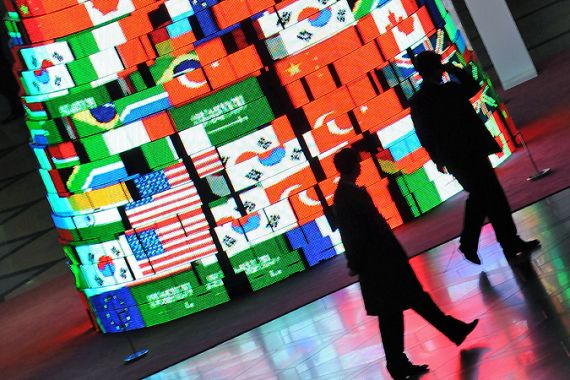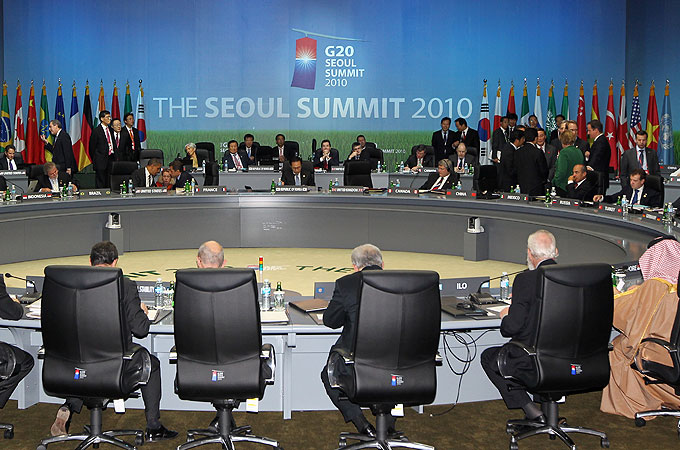G20 leaders claim ‘big progress’
Tighter financial regulations backed to guard against past excesses in final statement that reveals unresolved issues.

 |
| G20 leaders agreed in their final declaration to reorient trade between surplus and deficit economies [EPA] |
Leaders at the Group of 20 summit meeting in South Korea have claimed “big progress” in negotiations after agreeing to tackle global “tensions and vulnerabilities”.
The leaders reportedly disagreed on the wording of the final communique but decided to gloss over the ongoing debate about their economic policies.
Keep reading
list of 4 itemsChina’s economy beats expectations, growing 5.3 percent in first quarter
Inside the pressures facing Quebec’s billion-dollar maple syrup industry
Manipur’s BJP CM inflamed conflict: Assam Rifles report on India violence
Trade imbalances and protectionism have been the major sticking points at the meeting of the world’s biggest rich and emerging economies – the group’s fifth since the financial crisis exploded in 2008 – in Seoul.
In the communique issued on Friday, the G20 leaders endorsed tighter financial regulations, including bank capital and liquidity standards, to guard against what they called past excesses.
“This new framework … will ensure a more resilient financial system by reining in the past excesses of the financial sector and better serving the needs of our economies,” the statement said.
The G20 members agreed to set vague “indicative guidelines” to reorient trade between surplus and deficit economies but left the details to be discussed in the first half of next year.
They were unable to reach a consensus on how to identify when global imbalances pose a threat to economic stability, merely committing themselves to a discussion of a range of indicators in first half of 2011.
Window of opportunity
The G20 leaders further pledged moves “toward more market-determined exchange rate systems, enhancing exchange rate flexibility to reflect underlying economic fundamentals, and refraining from competitive devaluation of currencies”.
They also agreed that there was a critical, but narrow, window of opportunity to conclude the long-elusive Doha round of trade liberalisation launched in 2001.
“Risks remain,” the communique said. “Some of us are experiencing strong growth, while others face high levels of unemployment and sluggish recovery. Uneven growth and widening imbalances are fuelling the temptation to diverge from global solutions into uncoordinated actions.”
Slow-growing advanced economies have kept interest rates at record lows to try to kickstart growth, while big emerging markets have come roaring back so fast that many are worried about overheating.
Barack Obama, the US president, and Hu Jintao, the Chinese president, were among the leaders who cautioned that “risks remain” to the global economy and that “uncoordinated policy actions will only lead to worse outcomes for all”.
Hu demanded global resistance to trade barriers saying the international financial markets “are volatile, the fluctuation in the major currencies is large, prices of commodities are high, and there is a clear rise in protectionism”.
Fixing imbalances
Obama said there should be no controversy about fixing imbalances “that helped to contribute to the crisis that we just went through”.
The US plan to curtail trade imbalances was a backdoor way of forcing China to realign its currency, which critics say is kept deliberately cheap to support Chinese exporters.
But the proposal ran into trouble not just from China but from several other nations including Germany, Europe’s export champion, which insists that its own trading strengths have nothing to do with any currency manipulation.
Nicolas Sarkozy, the French president and incoming chairman of the G20, vowed on Friday to guide the grouping with “responsibility and realism”, and pledged to work “hand in hand” with the International Monetary Fund on global reforms.
A day earlier tempers had flared over the US Federal Reserve’s latest bond-buying programme, while Ireland’s worsening debt troubles served as a reminder that the financial system is far from fully healed.
Al Jazeera’s Rosiland Jordan, at the G20 summit venue, reported quoting a senior US government official that there had been a lot of concerted negotiations before the agreement was reached.
Needs of the poor
Our correspondent said the leaders made a point of trying to pay attention not just to the needs of the 19 largest industrial nations and the European Union, “but also to look at the needs of the poorer nations that were not officially represented at the G20 meeting”.
Ben Phillips, of Save the Children, said it was a real achievement by the South Koreans and civil society groups, who managed to put development on the meeting’s agenda.
“You cannot have a meeting that talks about the world economy and does not talk about the poorest people. It is now on the agenda and the G20 have acknowledged that the people who have suffered the most from the economic crisis are the poorest in the world,” he told Al Jazeera.
“We also know that 250,000 children will die because of the crisis, so any recovery package has to include the world’s poorest people.”
As part of the move to remove protectionist actions, Philips said rich countries “should open up their markets to the very, very poorest of countries to help them develop economically.
“They need aid and trade, both”.